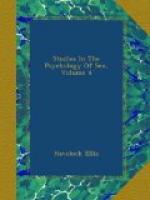In dealing with the question of sexual selection in man various writers have been puzzled by the problem presented by that abhorrence of incest which is usually, though not always so clearly marked among the different races of mankind.[184] It was once commonly stated, as by Morgan and by Maine, that this abhorrence was the result of experience; the marriages of closely related persons were found to be injurious to offspring and were therefore avoided. This theory, however, is baseless because the marriages of closely related persons are not injurious to the offspring. Consanguineous marriages, so closely as they can be investigated on a large scale,—that is to say, marriages between cousins,—as Huth was the first to show, develop no tendency to the production of offspring of impaired quality provided the parents are sound; they are only injurious in this respect in so far as they may lead to the union of couples who are both defective in the same direction. According to another theory, that of Westermarck, who has very fully and ably discussed the whole question,[185] “there is an innate aversion to sexual intercourse between persons living very closely together from early youth, and, as such persons are in most cases related, this feeling displays itself chiefly as a horror of intercourse between near kin.” Westermarck points out very truly that the prohibition of incest could not be founded on experience even if (as he is himself inclined to believe) consanguineous marriages are injurious to the offspring; incest is prevented “neither by laws, nor by customs, nor by education, but by an instinct which under normal circumstances makes sexual love between the nearest kin a psychic impossibility.” There is, however, a very radical objection to this theory. It assumes the existence of a kind of instinct which can with difficulty be accepted. An instinct is fundamentally a more or less complicated series of reflexes set in action by a definite stimulus. An innate tendency at once so specific and so merely negative, involving at the same time deliberate intellectual processes, can only with a certain force be introduced into the accepted class of instincts. It is as awkward and artificial an instinct as would be, let us say, an instinct to avoid eating the apples that grew in one’s own yard.[186]
The explanation of the abhorrence to incest is really, however, exceedingly simple. Any reader who has followed the discussion of sexual selection in the present volume and is also familiar with the “Analysis of the Sexual Impulse” set forth in the previous volume of these Studies will quickly perceive that the normal failure of the pairing instinct to manifest itself in the case of brothers and sisters, or of boys and girls brought up together from infancy, is a merely negative phenomenon due to the inevitable absence under those circumstances of the conditions which evoke the pairing impulse. Courtship is the process by which powerful sensory stimuli proceeding




